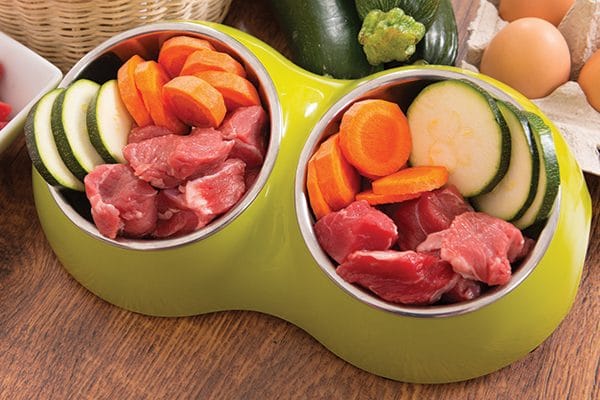When it comes to feeding raw to dogs, it is essential that you provide them with a balanced and varied diet full of healthy and nutritious ingredients, covering as much of the nutritional spectrum as possible.
Some owners choose to feed a ready prepared complete recipe that they buy frozen and pre-formulated while others prefer a pure mix complimentary meal, which includes the fundamental requirements of muscle meat, offal and bone in ratio. This allows additions of choice such as fruit, vegetables and other elements. Some owners like to do ‘DIY’ their raw, preparing everything from scratch themselves however this can be both time consuming and costly, sourcing the right cuts of meats and other ingredients. Also, this is potentially risky as, nutritionally, it may not form a completely balanced diet for your dog. If you are a raw feeder, or are considering switching to raw, it is important to ensure that your dog is getting sufficient quantities of the right macros and micronutrients in order to develop a strong immune system, aid digestion, promote healthy bones and be certain that they are in peak physical condition.
Nutritional Excellence is Achieved by ‘Balance Over Time’
It is important to remember that you don’t need to provide your dog with a completely balanced meal every day, but it is key that nutritionally, they get everything they need over time in an approach commonly referred to as ‘balance over time’. This means that as long as you give your dog the right amount of nutrients over the course of a week or month, you don’t have to worry so much about everything being in every meal itself. There are an abundance of foods that should be included in a balanced and varied raw diet. In addition to muscle meat, which is the main staple, you should be feeding bone, offal, tripe, vegetables, and other ingredients such as eggs, fruits and botanicals in set ratios, to help achieve the required nutritional balance and trace minerals needed. We take a look in more detail at the importance of each aspect:
Varied Proteins for Maximum Benefits
Chicken, beef, turkey, duck, lamb, salmon… all of these meats/fish are excellent sources of protein however there are key nutritional differences between them all and even between which cuts of the meat are selected. For example, chicken and turkey are both lean white meats that help dogs to build muscle while being gentle on the gut. Lamb and beef are packed full of essential amino acids and vitamins and minerals for strong healthy bones, shiny coats and great skin. For a truly balanced diet that gives your dog the right amount of proteins in equal measures, alternate the meats and indeed cuts of meat you give throughout the week or month as much as possible. In addition to giving them a great balance, it also stops them getting bored of the same food every day.
Bone for Healthy Digestion and Dental Hygiene
Bone is also crucial. By feeding a ready prepared formula like ProDog, which contains 10% ground bone, you know that your dog is always getting a sufficient amount of bone needed for both minerals like calcium and to aid digestion. Large meaty bones are also an excellent source of protein. While ground bone in a complete meal is enough to safely deliver what they need in their diet, an additional large bone (comparable to the dog’s size) is also a great way to stave of boredom in dogs, allowing them to work harder for their food and also assisting with good dental hygiene.
Offal – a Rich Source of Nutrients
Offal is a nutritional powerhouse for your dog and is loaded with vitamins, minerals and amino acids. This true and natural source of nutrition is exactly what a dog would feed on in the wild. It is important to not only feed raw muscle meat but to also ensure that there is offal in your dog’s diet. When feeding offal, the recommended amount is approx. 5% across the board of which approximately half should be liver. Be sure to note when doing your calculations that heart is considered muscle meat and not offal. We recommend that if your dog can tolerate offal, you feed one of our offal inclusive meal options 2 to 3 times a week.
Green Tripe Promotes Good Gut Health
Tripe is basically the stomach of an animal and its contents. Wild dogs will hunt and kill their prey and then eat the muscle meat and the contents of the stomach. The stomachs of grazing animals are full of nutritious vegetation that offer a variety of benefits. Green tripe, which should be unbleached to ensure its nutritional impact is maintained, may smell unsavoury but it is a much-needed natural probiotic which promotes fantastic gut health. When feeding tripe, try to include it with at least one meal over the course of a week.
Give them a Whole Egg
This is not only great fun as you watch them try and break into this delicious treat, there are so many benefits of feeding raw eggs to dogs. They can eat the shell as well as the contents, although avoid giving the shell to puppies under 1 year. They are a great source of protein and amino acids and can even help to settle an upset stomach however be careful not to feed too many. Use them a couple of times a week with their main meal. If you aren’t sure as to how fresh the egg is, break it first before you feed it but fresh, but raw eggs are perfectly safe for your dogs to consume. If you prefer you can just mix it in with their raw and serve.
Fruit and Vegetables
A true species appropriate raw diet should include a variety of ingredients which all work together to provide the maximum nutritional benefits. When balancing meals across a period of time remember to include vegetables – both leafy and root, fruit (excluding grapes and avocados) and botanicals to ensure trace element levels are achieved. Some additions you may wish to consider are:
- Carrots – Carrots contain beta carotene which the body converts to vitamin A. They also contain vitamin K and potassium which assists with the efficient functioning of nerves, muscles and enzymes.
- Broccoli – Broccoli is high in fibre and vitamin C and low in fat and should be given in small quantities to avoid an upset stomach.
- Cabbage – All types of cabbage are safe for dogs to eat and they are full of anti-oxidants. Cabbage aids with digestion and is good for the skin. Be careful not to feed too much. Just chop a bit up and add to their dinner.
- Spinach – With vitamins A ,B, C & K and minerals calcium, iron, manganese, folate and potassium, there is plenty of goodness in spinach, the benefits of which can help to boost the immune system and energy levels.
- Blueberries – A superfood which helps to rotifer against ageing, cancers and heart disease. High in a number of vitamins and minerals, they help fight urinary tract infractions and improve brain and memory function.
- Kelp – This seaweed which grows in shallow, nutrient-rich sea water contains iodine which is essential for healthy thyroid function. It also contains an abundance of vitamins and minerals including iron which supports circulation.
- Salmon Oil – An excellent source of omega-3 and omega-6 fatty acids, salmon oil supports a healthy immune system, promotes good heart health and has anti-inflammatory properties. Including a small amount in your dog’s diet will help to promote their health and well-being.
And that isn’t all… dogs can also eat apples (without the core), melon, apricot, asparagus, courgettes and more. Be careful of the quantities, some fruits in particular are very high in natural sugars and should be fed sparingly.
The Correct Balance of Macro and Micro-Nutrients
Essentially, what you are trying to achieve the right balance of nutrients. Just like making a cake, you need to ensure that you include the right ingredients in the correct quantity. Nutrients are required to maintain a healthy life and provide the building blocks to cells in the body. There are many forms which are broken down into macro and micro nutrients. Micro nutrients are vitamins and minerals required in small amounts but essential. Specifically, you are looking for vitamins such as B, C, K, and minerals which include zinc, iron, potassium, manganese and sodium. Each of these are present in all of the foods mentioned above in small quantities but are much needed for healthy growth and development of the body and the brain and nervous system.
Macro Nutrients and How they are Measured.
Macro nutrients are water, carbohydrates (converted to energy), fats and proteins. These macros are needed for both short-term and long-term energy as well as being essential for growth and development. Foods are measured and tested for the following macro nutrients:
- Moisture
- Protein
- Fat
- Ash
- Carbohydrate
- Fibre
- The key to a balanced and varied raw diet for your dog is to make sure they are getting a sufficient amount of both micro and macro nutrients.
Other additions to consider
Treats and Rewards
When it comes to treats be sure to include them in the total daily amount of food that you should be feeding your dog and not as an additional source. Too many treats on top of their normal food will encourage them to gain weight and become fussy. Treats are important for training and rewards but use them sparingly. In keeping with your raw diet, make sure they are also clean nutrition and not highly processed and full of rubbish. Dehydrated raw treats are great for keeping in the cupboard with ostrich training treats just the right size for keeping in your pocket.
Nutritional Supplements
While a balanced and varied raw diet will give your dog the vital nutrients they need, nutritional supplements are an excellent way to ensure that your dog is getting absolutely everything required in a measured quantity. They can be very useful if you have to avoid certain proteins or food groups for a particular reason such as food sensitivities, have a dog with a special support need due to illness or injury, or indeed if you are demanding more than normal from your dog from an activity perspective. At ProDog Raw we offer a range of all natural, organic supplements that are designed to deliver a plethora of benefits depending on the daily requirements of your dog’s routine. For agility dogs, working dogs and very active sport dogs for example, ProDog Revive is a great aid for recovery and protection while Maximus will help your dog build lean muscle mass and attain their absolute peak physical condition. Visit our website for more information on the range that we offer.
At ProDog, we take canine nutrition very seriously and are dedicated to providing only the best to each and every dog regardless of breed, size, age or health. Our range of 100% natural premium quality raw recipes and nutritional supplements are formulated and designed by experts to deliver everything your dog needs to obtain their ultimate condition. If you have any questions about feeding your dog a balanced and varied raw diet, we would love to help. Simply get in touch with one of the team to find out more.





Hi, my Staffy suffers with Pancreatitis.
I want to feed him a raw meat diet.
Can you tell me the fat content of your rabbit and chicken with beef. Also the fat content of your green tripe. Basically the fat content of all your raw meat products.
It’s vital he is kept on a low fat diet.
Thanks.
Sue W
Hi Sue
All of the fat contents are listed under the ‘nutritional analysis’ tab on each product page Sue
We would advise sticking to the options that are 10% fat content or less.
Kind regards
Team PDR
Hi I’ve just brought a pup German Shepard I want to feed it raw food as I been told it’s better for them, I’ve also been told to use you as your based in the uk
That’s great to hear. We have a new customer discount code offer currently of ProSaver20 if that helps with your first order! Raw rocks you will never look back Susan
Regards
Team PDR
I have joust started feeding my Boston Terrier your raw food puppy mix as he suffers with really smelly gas. Do I need to supplement the food with any other foods or does your product cover full nutritional needs. I have read your page on ‘The importance of a balanced and varied raw diet’ as can see several foods that I can add in as and when I have them in my larder.
Hi Lucy
Our puppy food is a nutritionally balanced formula that is designed to give them everything they need. However, if you want to you can give them extra vegetables and fruit with their food. Of course, you need to ensure that you include it within their daily allowance so as not to feed too much and it is completely down to you if you want to give them additional bits and pieces.
Team ProDog
Thanks that’s great advice… can I also add some offal i.e liver, kidney?
Hi – I have been feeding my 3-year old Lab raw for over a year now in the hope that it would sort out his anal gland problem – they need to be ’emptied’ every 4 weeks. Do you have any recommendations as to what I could add to his food that might help? I add carrots, sweet potato and any other vegs. available. Any help would be great.
Hi Jennifer and sorry for the delay.
We would advise stopping the carrots and sweet potato. Because they are high in carbs, they will loosen the stools. Feed more bone content to make them firmer, then bulk with psyllium husk. Use Aloe Vera from the leaf applied direct to the anal gland area. This will reduce inflammation.
Let us know how that goes and if you need any further advice.
Kind Regards
Team ProDog
Hi can you advise me any particular raw food diet for my 5 Frenchies or should I go through on the list you wrote?
Many thanks
Hi there
We would advise no chicken or beef
Regards
Team ProDog